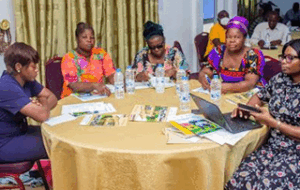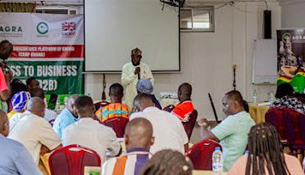By Samuel SAM & Sulemana ZAKARIA
A forum aimed at addressing perennial challenges within the rice value chain to strengthen food security and promote economic empowerment has been held in Tamale.
Stakeholders at the event called for a holistic and coordinated approach to enhance local rice production.
The forum formed part of the Competitive African Rice Platform (CARP-Ghana) Business-to-Business (B2B) workshop on rice sector development, supported by UK International Development and AGRA under the Sustainable Growing African Food Systems initiative.
It focused on achieving rice self-sufficiency by reducing post-harvest losses, strengthening milling capacities, improving access to finance and promoting competitive market linkages.

The CARP-Ghana programme is financially supported by the Foreign, Commonwealth and Development Office (FCDO) and AGRA, technically supported by GIZ and AGRA.
It aims to stimulate investment and collaboration across Ghana’s rice sector. The forum, themed ‘Strengthening Ghana’s Rice Value Chain: Partnerships for Growth and Market Competitiveness’, brought together stakeholders including smallholder farmers, research institutions, input suppliers, processors and financial institutions.
With CARP-Ghana’s activities aligned with the ECOWAS Rice Observatory (ERO) Rice Development Roadmap and Ghana’s National Rice Development Strategy (NRDS), the initiative aims to harmonise and coordinate policies and investment strategies across the sub-region.

According to the organisers, increased investment in the rice value chain presents opportunities for economic growth, job creation and enhanced food security. AGRA, they noted, remains committed to partnering with government and private stakeholders to develop the sector.
Northern Regional Director-Department of Agriculture Hajia Hawa Musah emphasised the importance of policy reforms to promote local rice production, which would reduce reliance on imports and help Ghana surpass the current 50 percent self-sufficiency threshold.
She noted that Ghana has the potential to become a net exporter of quality rice if strategic investments, best practices and stakeholder commitment are realised.
Senior Programme Officer of AGRA-West Africa, Sunil Dahiya, reiterated that Ghana possesses the resources needed to meet domestic rice demand and called for sustained government investment in the sector.
The Chairperson of CARP-Ghana’s board stated that the platform is positioned to enhance rice delivery within the ECOWAS sub-region. He observed that the ECOWAS leadership has recognised the excessive expenditure on rice imports, with the sub-region spending over US$5billion annually on rice procurement.
Mohammed Habib Abdullai, National Coordinator of CARP-Ghana, said the platform is committed to unlocking economic growth and ensuring food security through inclusive and environmentally sustainable practices that maximise Ghana’s rice sector potential.
He further explained that CARP-Ghana, a chapter of the Equal Rights Observatory, works to facilitate private sector investment and policy coordination.
“We ensure stakeholder coordination in rights-related policies and bring together producers, input dealers, processors, aggregators, exporters, financiers and businesspeople to create a more structured and coordinated platform,” he said.
“Our aim is to establish strong business linkages and ensure marketability of products, while fostering inclusive growth within the rice value chain,” he added.










